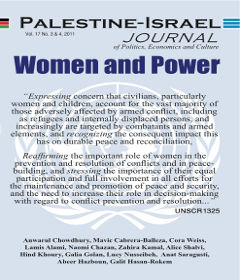The fact that this issue is titled Women and Power reflects a realization that women are not just victims of the conflict. They also can and should play a significant role in helping to resolve it. Women may argue that, since over the past 16 years men have not done a very good job of resolving the conflict, it is time to revisit the question of the potential unique contribution of women.
This is the second time that the Palestine-Israel Journal has devoted a special issue to the role of women in the Israeli-Palestinian conflict, and the potential role of women in helping to resolve the conflict. The first time was with Volume 2, No. 3, 1995, entitled Women in the Conflict.
A significant milestone was reached in the period between the two issues: the passing of UN Security Council Resolution 1325 in the year 2000, which mandates the involvement of women in political processes and the quest for peace and security throughout the world.
This year's Nobel Peace Prize was awarded to three women. This can be viewed as a tribute to the courageous civil society women who initiated and helped to draft UNSC Resolution 1325. Cora Weiss, one of these activists, says in this issue that this was the "1325 Nobel Peace Prize."
Many women participated in the Tunisian and Egyptian protest movements. The awarding of a Nobel Peace Prize to Tawakkul Karman, one of the leaders of the Yemenite protest movement, was an acknowledgment of the important role that women are playing in the Arab Spring. Women also took the lead in the Israeli social protest movement and were on the frontlines of the Parents' Stroller Protest and other actions.
This issue presents an in-depth analysis of gender perspectives, particularly the impact of the conflict on women and women's role in peacebuilding. The first section contains international articles that provide the context and background of UNSC Resolution 1325. The next section contains articles that provide Israeli and Palestinian analyses, viewpoints and descriptions of actions. This is followed by sections devoted to joint Israeli-Palestinian projects and regional articles. Four stimulating interviews are followed by a thoughtprovoking roundtable, a cultural section and relevant documents.
Our goal is to provide tools for Israeli and Palestinian civil society - particularly women's groups and those who support their struggle for peace, democracy and equal rights.

